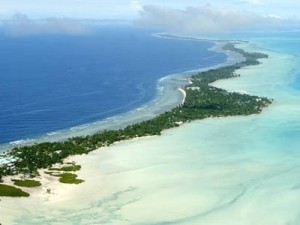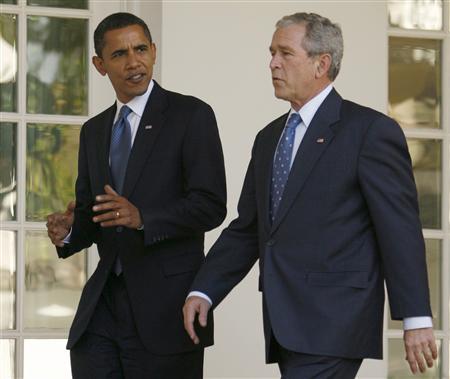The Republic of Kiribati hosted a side event today that was both emotional as well as a call for immediate action. For all those who are not familiar with Kiribati it is the largest atoll nation in the world, comprising 33 distincnt islands including the world’s largest marine protected area (Phoenix Island). It is also the most vulnerable to the imminent dangers of climate change. Tessie Eria Lambourne, Secretary of Foreign Affairs, said Kiribati is “in the front of the the front line” of those nations facing irreversible climate change impacts. She and her colleagues cited the immediate effects climate change has on freshwater resources, which already accounts for high infant mortality rates throughout the islands. Even worse, without serious emission reductions worldwide, the majority of Kiribati will be inundated with water by the end of the century. This is especially troubling in a nation where it’s capital island, South Tarawa, has a comparable population density with Hong Kong.

"We don't have much choice regarding our island's geography....We don't want to be environmental refugees"- Kiribati Secretaries of Environment and Foreign Affairs
Kiribati is doing everything it can to reduce its own carbon footprint and is encourage other nations to do the same. It is a member of the Alliance of Small Island States (AOSIS) and is actively engaging the COP15 negotiations. Luckily and understandably so, the UNFCCC recognized constituency dedicated to the interests of youths worldwide (commonly referred to as the YOUNGOs) has formed a positive relationship with AOSIS members. This relationship was forged because the dangers of climate change will be felt most heavily between these two groups. As a result both groups carry more weight in influencing the decision makers attending the official negotiations and plenary sessions. This type of engagement and collaboration has been one of the most impressive take-aways from the negotiations thus far. It is encouraging seeing people from all over the world, regardless of position, sex, or race, come together to work to do their part in tackling this beast of a problem. And that what its going to take.
Nevertheless, the situation of climate change will be felt by the citizens of Kiribati and youth worldwide for quite some time to come. And only halfway into week one of COP15, there remains many more questions than answers.
Tags: climate change, interconnectivity, Sea level rise, Water shortage
Today a US Envoy on Climate Change, Todd Stern, gave a press briefing at COP-15. The following is a selected summary of his initial introduction.
We have demonstrated a strong commitment to this issue from day one. President Obama came into office focused foremost on economic stimulus package. In that package included the highest vehicle emissions standards we’ve ever had. The EPA has moved to start regulating stationary sources of CO2. We have comprehensive legislation that moved through House and pending in Senate. The US commitment is strong. We have articulated a US target within the last few weeks. That ramps up, or is part of an overall legislative package. To give you an example, by 2025, the reduction will be 30% below 2005. Also, President Obama is attending the conference. Action by the US or by the entire developed group is not nearly enough. A core part of this negotiation will be to have significant action by major developing countries. There is no question that we have, that the US has, the largest historical greenhouse gas emission. It is also true, that most of greenhouse gases come from developing countries. There is simply no way to solve this problem without support of major developing countries. “it is essential that they step forward and make implementation of actions transparent. The object is to get the best agreement we can to set the world on the path to success.”
During the question and answer session one journalist asked a question regarding the US’ stance on the Kyoto Protocol. He asked, “The US has said that it won’t sign an agreement based on the Kyoto Protocol, if things head in that direction (of Kyoto), would the US agree to such an agreement?” The US official answered by saying that the US is seriously not going to become part of the Kyoto Protocol. “That isn’t on the table. If you mean that taking the Kyoto Protocol and putting a new title, we won’t do that either. There may be elements of Kyoto that are similar to what is being discussed. I wouldn’t rule that out. We won’t do Kyoto.”
Later he was asked if he felt that the US has “climate debt.” He acknowledged that the US has a “historical role,” but “categorically rejects” guilt or the idea of reparations. Instead he said, “There are real needs all over the world that need to be met. We shouldn’t be looking at this agreement simply to cap emissions but we should be looking at this as a development, a sustainable development opportunity…”
It is telling that 12 years after the US chose not to sign Kyoto, there has not been a significant shift in the types of policies it deems acceptable. Is that acceptable?
Tags: COP15 Resources, Obama, US Energy Policy
From the window of the plane to Copenhagen, at around 1am EST (or 7am in Denmark) I could see the entirety of the United Kingdom outlined in lights. From 38,003 ft., the world which had once seemed impossibly large – which had previously been seen only on maps, and what sense did those really give about size or distance anyway? – now fit into my little window no more than a foot across. For the first time I truly saw our influence: we could light up every square inch of a country so that the detail of its profile was finer seen from above than in the guidebook map on the seat next to me. The glow of our existence, at once so vast and simultaneously palatable, sent a shiver down my spine that whatever deity made this place surely felt when he finished – one of both fear and hope. That we held a power never before heard of; that global anthropogenic change was not just possible, but child’s play, was at once horrifying and infinitely reassuring – but it could only be reassuring if we recognized our influence. If indeed we were going to Copenhagen for this experience: this looking out the plane window and seeing that we not only had the power to change the world, but that we had already changed every square inch, then surely we would recogonize the need for our influence to be positive.
Two days later, Lisa Jackson, administrator of the EPA, made the long overdue announcement that “greenhouse gases threaten public health and the environment” and that “science overwhelmingly shows greenhouse gas concentrations at unprecedented levels due to human activity.”
Two days after that, I had the great pleasure to hear Administrator Jackson speak in the U.S. Center Meeting Room at the Bella Center in Copenhagen, and announce the impact of this announcement. Indeed that we had finally looked out the plane window, we had finally recognized the threat to public health of greenhouse gases made it possible, and indeed necessary for legislation to pass under the Clean Air Act.
We should now be hopeful for President Obama’s arrival at the conference next week. His commitment of a 20% reduction below 2005 levels by 2020 should be received in earnest.
Surely, this recognition should render the lights the profile every nation when seen from space as a beacon of hope: a sign of what we’ve made, rather than what we’ve destroyed.
Read all articles by Brett Shollenberger on this blog!
Read articles by Brett Shollenberger in Dickinson Magazine!
Read Brett Shollenberger‘s blog!
Tags: Brett Shollenberger, climate, common but differentiated responsibilites

We Cannot Wait for Climate Justice
The Policy group is working to organize an event for The Future Generations event tomorrow. We hope to reserve a booth in order to both further our video research and give US youth the ability to write to their representatives back home to support the passage of new climate bills.
The conference is such a great place to get involved and have your voice heard. We have been working in concert with the YOUNGOs which are an incredibly organized, talented, and driven group of youths. There is a meeting that we plan to attend this afternoon that is a policy organizing group: hopefully, we will be able to offer ome valuable feedback and insight :).
Yesterday, I went to a high-level event with my peers in which high ranking officials spoke to the international youth. After they had spoken, the youth who had helped to organize the meeting gave both of the speakers t-shirts saying “How old will you be in 2050?” That is when it dawned upon me: it is the youth that will feel the results of these decisions made here in Copenhagen. It is us that will feel the real effects, whether positive or negative. All the people making these decisions right now are going to be dead or quickly along their way by 2050. Therefore, it is our voice that needs to be heard. We are the future. If these people cannot step up to plate and make decisions that are ultimately going to determine the fate of the planet, it is we who have to take initiative. It doesn’t matter who you are, you have a vested interest in this problem. You don’t have to be an Environmental Studies major to care about your future. And your future is exactly what the outcome of the negotiations here in Copenhagen will determine.
Tags: future, how old will you be in 2050?, youth climate action
Even though it is a little early to begin making generalizations, I feel that there is this common desire among developing countries to have a legally binding agreement for ALL countries, not just developed countries and a few developing countries which are growing at rapid rate, such as China and India. Many of the delegates my group has interviewed many of who are from developing countries feel that it is imperative that all countries sign onto a legally binding agreement at the end of this conference. Even though there is a lot of talk that an agreement will not be met until next years COP16 meeting in Mexico, many remain optimistic. According to a news press, Secretary-General Ban Ki-moon believes that we will reach an agreement at the end of the Copenhagen conference. He stated that “ [in order] for the Copenhagen conference to be a success, the agreement must include ambitious reductions in carbon emissions by developed countries as well as ambitious actions by poorer developing countries to curb emissions. Rich nations must also provide financial support and technological assistance to help developing countries limit their emissions and adapt to the effects of climate change, including floods and drought,” implying that there will be a legally binding agreement for ALL countries, beginning to break down this idea that developing countries do not have to take action. Even though I do not believe that this agreement will cause an “immediate operational effect as soon as it is agreed,” as Ban stated yesterday, I do believe that we can and should focus on coming to a consensus and sign an legally binding agreement, using next years COP16 meeting to figure out the logistics of implementation. To read more about this press release, click here.
Tags: climate change, COP15 Resources, Dickinson College, Kyoto to Copenhagen, student-citizens



Your Comments